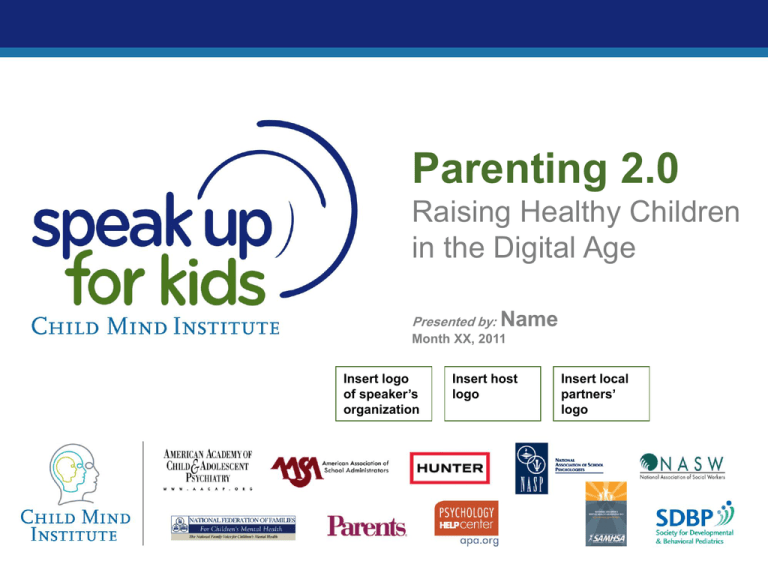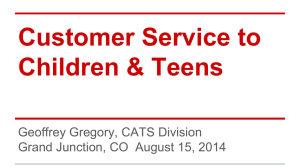
Parenting 2.0
Raising Healthy Children
in the Digital Age
Presented by:
Name
Month XX, 2011
Insert logo
of speaker’s
organization
Insert host
logo
Insert local
partners’
logo
New (and Not so New)
Challenges
•
•
•
•
Screentime and healthy development
Social media and cyberbullying
The internet and school
Privacy and sex
Déjà Vu All Over Again
• Changes in technology throughout history have
prompted worry about its effects
• “When the telephone was introduced, there was
some hand-wringing over the social dangers that
this new technology posed…‘It was going to bring
down our society,’ said Dr. Megan Moreno…‘we’d
never have civilized conversations again.’”
–Peri Klass, MD, NYT
What’s Going On?
• Research is ongoing, but we don’t really
understand all the outcomes
• What do we know?
– 95% of teens are online, getting information from
Wikipedia or connecting on Facebook (Pew)
– Almost three quarters of kids 2-8 watch TV every day,
and 52% of children have access to mobile digital
devices like smartphones or iPods (CSM)
– Kids 8 to 18 spend an average of 7.5 hours a day
“exposed” to media of all kinds (Kaiser)
All That Media Must
Do Something, Right?
• The amount of time spent with media means we
must try to understand the possible effects
• Some are simple, others are more complicated
• Some studies have suggested negative
psychological and educational effects of media
• Other studies suggest positive educational effects
of certain media
• New media has been implicated in everything from
ADHD and teen suicide to improved school
performance and better social communication
Screentime
• Many TV shows, videos, video games and digital apps
are fast-paced and stimulating
– Not at the level of comprehension of young kids
– Not adjustable like personal interactions
• When parents interact with kids, the back and forth can
be really meaningful and tailored to the individual
• When kids are passively viewing, they are not doing
other crucial developmental tasks
– Motor skills
– Social interaction
– Problem solving
Screentime
• With toddlers and kids in elementary school, it is still
important that media be representative of real-life events
and tasks
• In older kids, screentime is unavoidable
• Regardless of age, always consider Lisa Guernsey’s
“Three Cs”:
– Content: Is the program, game, or app developmentally
appropriate?
– Context: Is the child passively viewing, or interacting in a way
that encourages understanding?
– Child: Every kid is different
What Can You Do?
• Monitor Them!
• American Academy of Pediatrics: “keep children
under age 2 as ‘screen-free’ as possible”
– “Unstructured play time is more valuable for the
developing brain than electronic media.”
– Important social and motor skills are developed by
interaction and trial-and-error, not passive viewing
• In older kids, remember to consider “content,
context, and the individual child”
What Can You Do?
• Monitor yourself!
– A TV that is always on is “background media” that still shapes
a child’s attitudes
– TV is not a babysitter, so use sparingly
– New interactive screen technology may be better, particularly
if you use it with your child. But be aware of your child’s
developmental stage:
• “There are better teething devices than electronics. If your kids
start to put your phone in their mouth, they're too young to use it.”
(Common Sense Media)
– Set an example: Parents are the model kids follow, so:
• Consume media in moderation
• Don’t use your phone when you wouldn’t want your child to
Online Schooling
• Changes in access to technology, educational
philosophy, and funding have led to an explosion in
K-12 online, or cyber, learning
• Some states and municipalities allow free, full-time
cyber learning through public schools.
• Some districts allow students to take specialized or
low-enrollment classes online, like AP courses
• Online education is available in nearly every state,
and some enrollment estimates top 4M
• Studies suggest online learning improves performance,
but data for K-12 is lacking
•
Online Schooling Pros
• Students who have trouble in a traditional school
environment may thrive with online learning
• Studies suggest that online learning as an adjunct to
classroom learning can have good outcomes
• Students who have keen interests or are ahead of peers
can direct their own learning
• In the ongoing school budget crisis, kids still have access
to advanced education
• Potential to close achievement gaps between districts
• Anecdotally, struggling students have said cyber learning
is the only way they were able to graduate
Online Schooling Cons
• Lack of traditional structure can interfere with
focused learning
• Evidence of success in post-secondary
environment may not translate to K-12
• Troubling questions about for-profit providers
• Concerns about adequate staffing, quality of
instruction, and test results
• Potential to interfere with socialization
What Can You Do?
• If online courses are offered in your district, and they
likely are, you can try them out
• As with any screen time or internet activity, monitor your
child
• Your input here is as important as social interaction with
a younger child
• The parent takes on many of the teacher’s traditional roles
in online learning—be committed and prepared
• Don’t neglect the social needs of your child
Social Media, Texting,
Cyberbullying…Oh My!
• 95% of teens are online, and 80% of them use social
media like Twitter, Facebook, or Tumblr
• While 88% have witnessed cruelty online, just 15% say
mean comments or actions have been aimed at them
• Just 17% of kids have profiles anyone can see…
• …but these kids are twice as likely to have bad
experiences online
Risks of Social Networking
• Cyberbullying and teen suicide are in the news
– Bullying online is more likely when young people
share indiscriminately…
– …but the majority of young people say they have
withheld damaging information after thinking about
posting
– Older teens are much more likely than 12-13 year
olds to think about the consequences of sharing
Risks of Social Networking
• It’s easy to be mean
– Separated from face-to-face interaction, kids can become
impulsive, insensitive, and say things online they wouldn’t
otherwise say
– Conversely, things said online can have an outsized effect
on the bullied child because they cannot as easily put jabs
in context
• Friends can’t be found
– The Internet can be a lonely place, and even a child with a
support network at school might feel like they are going it
alone
Risks of Social Networking
• Younger and younger children are on Facebook:
7.5 million kids under the age of 13
• These kids are just learning to navigate new
social situations and the trials of puberty
• For the younger set, social media can:
–
–
–
–
Amplify feelings of inequality
Confuse friendships
Encourage jealousy
Complicate the parent-child relationship
Pros of Online
Communities
• Online communities can be liberating for teens
who are creating their adult identity
– Hobbies and interests
– Groups of likeminded people
– Outlets for kids struggling with identity, like gay and
lesbian teens
• Many people in the LGBT community say communities
like those available online literally saved their lives
– A reprieve from loneliness and isolation for teens who
struggle with the social demands of school
Cons of Online
Communities
• These communities can be very misguided
(and anonymous)
–
–
–
–
Pro-anorexia message boards
Self-harm videos on YouTube
Am I Ugly? videos on YouTube
Hackers, “flamers,” and “trolls”
What Can Parents Do?
• Talk to your child early and often
– Don’t wait until your child is online before discussing:
•
•
•
•
a stranger is a stranger anywhere
think before you share
anonymity isn’t an excuse for meanness
If you see something, say something
• Build trust
– Let your child know you are concerned and always
available to talk. Remember:
• You can’t monitor 24/7
• When parents are intrusive, children can withdraw; posting on
a child’s profile page can bring the conversation to a halt
• Encourage your child to come to you
What Can Parents Do?
• Use the tools of the internet
– Checking in on your child’s profile discreetly can give
you an idea of how they are doing online.
– You can set up Google Alerts that will clue you in
if anything is publicly posted about your child
• Lead by example
– Model courteous online behavior
– Limit your own time online to encourage your child to
pursue other things
– Be aware of how much you share about yourself
(to model restraint) and your family (to protect your child)
If There Is an Incident…
•
•
•
•
•
•
•
•
Take quick action
Talk with your children
Tell your child not to respond to cyberbullying
Empathize with your child
Work together to find solutions
Document ongoing cyberbullying
Block the person who is cyberbullying your child
Be persistent
If It’s Too Much…
• If someone is at immediate risk of harm, call the police (911)
• If your child is feeling suicidal, contact the suicide prevention
hotline (800-273-TALK)
• If your child’s teacher is not keeping your child safe, contact the
principal or superintendent
• If your school is not keeping your child safe, contact the state
school department
• If your child is sick, stressed, not sleeping, or experiencing other
problems, contact your child’s school counselor or another health
or mental health professional
• If your child is bullied because of their race, ethnicity, or disability
and local help is not working, contact the US Department of
Education’s Office on Civil Rights
Privacy, Sex, and
Consequences
• Sexting is real but uncommon
– Just 2.5 percent of kids 10 to 17 say they have
sent partially nude pictures to others
– 7.1 percent said they had received sexually
provocative images from someone else
• Though there are real dangers
– Legal action
– Humiliation
– Loss of opportunity
Pornography
• Pornography is ubiquitous, and chances are a child
on the internet will come across it
• To help your child eventually develop a healthy
attitude towards sex, tell them:
– Porn stars aren't meant to look real. No one should expect to
look that way naturally.
– Porn sex isn't real either—it's fantasy. In the real world, people
don't relate to each other this way.
– The unrealistic expectations and simplified sex in porn can be
damaging to real relationships.
– Young men obsessed with online porn report having serious
problems with their real romantic lives.
Privacy
• Nothing put online every really goes away
• Children need to understand this
– Younger tweens and teens need your help especially as they are
very impulsive
– Older teens preparing to graduate from high school have a
better sense of what is appropriate
• The most vulnerable young people often look for
validation online…
• …but there is no guarantee that others will
respond in the desired way
Privacy
• Physical danger is rare, but possible
– Predators
– Fights at school
– Self-injury
General Signs for
Concern
• School failure, disruptive behavior, obesity
– New technology provides more opportunity for
distraction and sedentary behavior
• Depression, anxiety, school refusal
– Online bullying, feelings of social inadequacy, or lack
of socialization can lead to signs of depression
– Conversely, young people often show signs of
depression on their online profiles, which could lead
to identification and treatment
PLUSES
• A Brave New World
– The internet, social networks, interactive technology
can be incredible for young people
– The immediacy of communication that can devastate
a 13-year-old can also connect that child to
communities around the world
– Access to information has never been more fluid
– Far-flung families—in the military, for instance—or
even moms and dads who work late can stay in touch
like never before with new technologies
An Old Saw…
• We won’t know what the real effects of the present
communication revolution are until it has passed
• But beyond visions of “how it used to be,” history shows us
that people adapt, and children are resilient
• The present media environment is the only one your
children have known
• Your job as a parent is to know what’s going on, give good
advice and model common sense, just like parents have
always done. You also need to know what a tumblr is.
Additional Resources
• [Include your contact information]
• [Add information on resources in your
area]
Learn more about depression on childmind.org
Thank you for joining us to
Speak Up for Kids!







